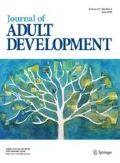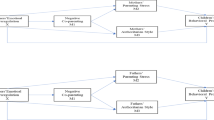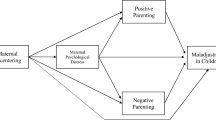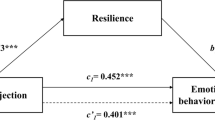Abstract
Several empirical studies have linked parenting styles with different mental health consequences in samples from Western nations, with some studies also in East Asian countries. However, few studies have analyzed such associations specifically in South Asian countries such as Pakistan. Moreover, few studies have examined the potential interactive role of parental rearing practices by both parents in relation to distress tolerance and psychological distress. In the current study, we evaluated the interaction of mothers’ and fathers’ parenting styles in relation to distress tolerance and psychological distress in Pakistani university students. Three hundred university students were recruited using a stratified sampling strategy. Students completed measures of their mothers’ and fathers’ parenting styles (separately), their distress tolerance, and their general psychological distress. There was great similarity in respondents’ recollection of parenting styles by mothers and fathers. Results of regression analyses indicated that high parental rejection and overprotection were associated with poorer distress tolerance and greater psychological distress. Although the direct associations of emotional warmth with distress tolerance and psychological distress were small, emotional warmth interacted with other parenting styles, such that negative effects of parental rejection and overprotection were lessened in the context of higher emotional warmth.

Similar content being viewed by others
References
Aiken, L. S., & West, S. G. (1991). Multiple regression: Testing and interpreting interactions. Sage Publications, Inc.
Allen, E. S., Grolnick, W. S., & Córdova, J. V. (2019). Evaluating a self-determination theory-based preventive parenting consultation: The parent check-in. Journal of Child and Family Studies, 28, 732–743.
Ansari, W. E., Dibba, E., Labeeb, S., & Stock, C. (2014). Body image concern and its correlates among male and female undergraduate students at Assuit University in Egypt. Global Journal of Health Science, 6, 105–117. https://doi.org/10.5539/gjhs.v6n5p105
Arrindell, W. A., Perris, C., Eisemann, M., Van der Ende, J., Gazner, P., Iwawaki, S., Maj, M., & Zhang, J. (1994). Parental rearing behaviour from a cross-cultural perspective: A summary of data in 14 nations. In C. Perris, W. A. Arrindell, & M. Eisemann (Eds.), Parenting and psychopathology (pp. 145–171). Wiley.
Azhar, M., & Saleem, S. (2017). The development of a Distress Tolerance Scale (Unpublished masters thesis). Institute of Clinical Psychology, University of Management and Technology, Lahore. Pakistan.
Barlow, D. H., Allen, L. B., & Choate, M. L. (2004). Toward a unified treatment for emotional distorders. Behavior Therapy, 2, 205–230. https://doi.org/10.1016/S0005-7894(04)80036-4
Baumrind, D. (1966). Effects of authoritative parental control on child behaviour. Child Development, 37, 887–907. https://doi.org/10.2307/1126611
Bilal, K., Sadiq, U., & Ali, S. (2013). Parenting practices and well-being outcome in young adulthood. Pakistan Journal of Social and Clinical Psychology, 11, 84–87.
Bornstein, M. H. (2012). Cultural approaches to parenting. Parenting, 12, 212–221.
Bowlby, J. (1973). Attachment and Loss: Volume 2. Separation. New York: Basic Books.
Bronfenbrenner, U., & Morris, P. A. (2006). The bioecological model of human development. In R. M. Lerner & W. Damon (Eds.), Handbook of Child Psychology (6th ed., Vol. 1, pp. 793–828). Wiley.
Carr, A., & Pike, A. (2012). Maternal scaffolding behavior: Links with parenting style and maternal education. Developmental Psychology, 48, 543–551.
Chang, L., Schwartz, D., Dodge, K. A., & McBirde-Chang, C. (2003). Harsh parenting in relation to child emotion regulation and aggression. Journal of Family Psychology, 17, 598–606.
Chao, R. K. (1994). Beyond parental control and authoritarian parenting style: Understanding Chinese parenting through the cultural notion of training. Child Development, 65, 1111–1119.
Chew-Graham, C. A., Rogers, A., & Yassin, N. (2003). ‘I wouldn’t want it on my CV or their records’’: Medical students’ experiences of help-seeking for mental health problems.’ Medical Education, 37, 873–880. https://doi.org/10.1046/j.1365-2923.2003.01627.x
Dachew, B. A., Bisetegn, T. A., & Gebremariam, R. B. (2015). Prevalence of mental distress and associated factors among undergraduate students of University of Gondar, northwest Ethiopia: a cross-sectional institutional based study. PLoS ONE. https://doi.org/10.1371/journal.pone.0119464
Daughters, S. B., Gorka, S. M., Rutherford, J. V. H., & Mayes, L. C. (2014). Maternal and adolescent distress tolerance: the moderating role of gender. Emotion, 14, 416–424. https://doi.org/10.1037/a0034991
Dwairy, M., Achoui, M., Abouserie, R., & Farah, A. (2006). Parenting styles, individuation, and mental health of Arab adolescents: A third cross-regional research study. Journal of Cross-Cultural Psychology, 37, 262–272.
Eisenberg, D., Gollust, S. E., Golberstein, E., & Hefner, J. L. (2007). Prevalence and correlates of depression, anxiety, and suicidality among university students. American Journal of Orthopsychiatry, 77, 534–542. https://doi.org/10.1037/0002-9432.77.4.534
Eisenberg, N., Spinrad, T. L., & Morris, A. S. (2002). Regulation, resiliency, and quality of social functioning. Self and Identity, 1, 121–128. https://doi.org/10.1080/152988602317319294
Froiland, J. M. (2015). Parents’ weekly descriptions of autonomy supportive communication: Promoting children’s motivation to learn and positive emotions. Journal of Child and Family Studies, 24, 117–126.
Froiland, J. M., & Whitney, N. (2015). Parenting style, gender, beer drinking and drinking problems of college students. International Journal of Psychology: A Biopsychosocial Approach, 16, 93–109.
Gaher, R., Hofman, N., Simons, J., & Hunsaker, R. (2013). Emotion regulation deficits and mediators between trauma exposure and borderline symptoms. Cognitive Therapy and Research, 37, 466–475. https://doi.org/10.1007/s10608-012-9515-y
Granic, I., & Patterson, G. R. (2006). Toward a comprehensive model of antisocial development: A dynamic systems approach. Psychological Review, 113, 101–131.
Hunt, J., & Eisenberg, D. (2010). Mental health problems and help-seeking behaviour among college students. Journal of Adolescent Health, 46, 3–10. https://doi.org/10.1016/j.jadohealth.2009.08.008
Imran, N., Haider, I. I., Sohail, A., Zafar, M., & Bhatti, M. R. (2010). Perceptions of and attitudes to alcohol use among Pakistani medical students. International Psychiatry, 7(4), 82–83.
Javed, N., Ahmed, F., Saeed, S., Amir, R., Khan, H., & Iqbal, S. P. (2019). Prevalence of Methylphenidate Misuse in Medical Colleges in Pakistan: A Cross-sectional Study. Cureus, 11(10), e5879. https://doi.org/10.7759/cureus.5879
Joussemet, M., Mageau, G. A., & Koestner, R. (2014). Promoting optimal parenting and children’s mental health: A preliminary evaluation of the how-to parenting program. Journal of Child and Family Studies, 23, 949–964.
Jung, E., Hwang, W., Kim, S., Sin, H., Zhang, Y., & Zhao, Z. (2019). Relationships among helicopter parenting, self-efficacy, and academic outcome in American and South Korean college students. Journal of Family Issues, 40, 2849–2870.
Kagitcibasi, C. (1970). Social norms and authoritarianism: A Turkish-American comparison. Journal of Personality and Social Psychology, 16, 444–451.
Kagitcibasi, C. (1994). A critical appraisal of individualism and collectivism: Toward a new formulation. In U. Kim, H. C. Triandis, C. Kağıtçıbaşı, S. C. Choi, & G. Yoon (Eds.), Individualism and collectivism: Theory, method and applications (pp. 52–65). Sage.
Kagitcibasi, C. (2005). Autonomy and relatedness in cultural context: Implications for self. Journal of Cross-Cultural Psychology, 36(4), 403–422.
Kausar, R., & Shafique, N. (2008). Gender differences in perceived parenting styles and socioemotional adjustment of adolescents. Pakistan Journal of Psychological Research, 23, 93–105.
Kivisto, K. L., Welsh, D. P., Darling, N., & Culpepper, C. L. (2015). Family enmeshment, adolescent emotion dysregulation, and the moderating role of gender. Journal of Family Psychology, 29, 604–613. https://doi.org/10.1037/fam0000118
Kozak, A. T., & Fought, A. (2011). Beyond alcohol and drug addiction. Does the negative trait of low distress tolerance have an association with overeating? Appetite, 57, 578–581. https://doi.org/10.1016/j.appet.2011.07.008
Kumar, H., Shaheen, A., Rasool, I., & Shafi, M. (2016). Psychological distress and life satisfaction among university students. Journal of Psychology & Clinical Psychiatry. https://doi.org/10.15406/jpcpy.2016.05.00283
Lalwani, A. K., Shavitt, S., & Johnson, T. (2006). What is the relation between cultural orientation and socially desirable responding? Journal of Personality and Social Psychology, 90, 165–178.
Leyro, T. M., Zvolensky, M. J., & Bernstein, A. (2010). Distress tolerance and psychopathological symptoms and disorders: A review of the empirical literature among adults. Psychological Bulletin, 136, 576–600. https://doi.org/10.1037/a0019712
Li, X., & Meier, J. (2017). Father love and mother love: Contributions of parental acceptance to children’s psychological adjustment. Journal of Family Theory & Review, 9, 459–490.
Li, Y., Costanzo, P. R., & Putallaz, M. (2010). Maternal socialization goals, parenting styles, and social-emotional adjustment among Chinese and European American young adults: Testing a mediation model. The Journal of Genetic Psychology, 17, 330–362.
Lieb, R., Wittchen, H. U., Höfler, M., Fuetsch, M., Stein, M. B., & Merikangas, K. R. (2000). Parental psychopathology, parenting styles, and the risk of social phobia in offspring: a prospective-longitudinal community study. Archives of General Psychiatry, 57, 859–866.
Linehan, M., & M., . (2014). DBT Training Manual. The Guilford Press.
Lovibond, S. H., & Lovibond, P. F. (1995). Manual for the Depression Anxiety Stress Scales (2nd ed.). Psychology Foundation.
Manzeske, D. P., & Stright, A. (2009). Parenting styles and emotion regulation: the role of behavioural and psychological control during young adulthood. Journal of Adult Development, 16, 223–229. https://doi.org/10.1007/s10804-009-9068-9
McKee, L., Roland, E., Coffelt, N., Olson, A. L., Forehand, R., Massari, C., & Zens, M. S. (2007). Harsh discipline and child problem behaviors: The roles of positive parenting and gender. Journal of Family Violence, 22, 187–196.
Meesters, C., & Muris, P. (2004). Perceived parental rearing behaviours and coping in young adolescents. Personality and Individual Differences, 37, 513–522. https://doi.org/10.1016/j.paid.2003.09.022
Morris, A. S., Silk, J. S., Steinberg, L., Myers, S. S., & Robinson, L. R. (2007). The role of family context in the development of emotion regulation. Social Development, 16, 361–388. https://doi.org/10.1111/j.1467-9507.2007.00389.x
Mousavi, S. E., Low, W. Y., & Hashim, A. H. (2016). Perceived parenting styles and cultural influences in adolescent’s anxiety: A cross-cultural comparison. Journal of Child & Family Studies, 25, 2102–2110. https://doi.org/10.1007/s10826-016-0393-x
Muhomba, M., Chugani, C. D., Uliaszek, A. A., & Kannan, D. (2017). Distress tolerance skills for college students: A pilot investigation of a brief DBT group skills training program. Journal of College Student Psychotherapy, 3, 247–256. https://doi.org/10.1080/87568225.2017.1294469
Orsillo, S. M., & Roemer, L. (2005). Acceptance and mindfulness-based approaches to anxiety: Conceptualization and treatment. Springer Science + Business Media. https://doi.org/10.1007/b136521
Perez, C. M., Nicholson, B. C., Dahlen, E. R., & Leuty, M. E. (2020). Overparenting and emerging adults’ mental health: The mediating role of emotional distress tolerance. Journal of Child and Family Studies, 29, 374–381.
Perris, C., Jacobsson, L., Lindstorm, H., von Knorring, L., & Perris, H. (1980). Development of a new inventory for assessing memories of parental rearing behaviour. Acta Psychiatrica Scandinavica, 61, 265–274.
Pinquart, M., & Kauser, R. (2018). Do the associations of parenting styles with behavior problems and academic achievement vary by culture? Results from a meta-analysis. Cultural Diversity and Ethnic Minority Psychology, 24, 75–100.
Rodgers, L. S., & Tennison, L. R. (2009). A preliminary assessment of adjustment disorder among first-year college students. Archives of Psychiatric Nursing, 23, 220–230. https://doi.org/10.1016/j.apnu.2008.05.007
Rohner, R. P., & Lansford, J. E. (2017). Deep structure of the human affectional system: Introduction to interpersonal acceptance–rejection theory. Journal of Family Theory & Review, 9, 426–440.
Rothenberg, W. A., Lansford, J. E., Bornstein, M. H., Chang, L., Deatera, D. K., Di Giunta, L., et al. (2020). Effects of parental warmth and behavioral control on adolescent externalizing and internalizing trajectories across cultures. Journal of Research on Adolescence, 30(4), 835–855.
Ryan, R. M., & Deci, E. L. (2000). Self-determination theory and the facilitation of intrinsic motivation, social development, and wellbeing. American Psychologist, 55, 68–78.
Sahithya, B. R., Manohari, S. M., & Vijaya, R. (2019). Parenting styles and its impact on children – a cross cultural review with a focus on India. Mental Health, Religion and Culture, 22(4), 357–383.
Saleem, S., Mahmood, Z., & Naz, M. (2013). Mental health problems in university students: A prevalence study. FWU Journal of Social Sciences, 7(2), 124–130.
Saleem, S., Mahmood, Z., & Subhan, S. (2015). Perceived parental practices and mental health problems: Cross-cultural validation of EMBU-C on Pakistani adolescents. FWU Journal of Social Sciences, 9(1), 44–52.
Selin, H. (2014). Parenting across cultures: Childrearing, motherhood and fatherhood in non-Western cultures. Springer.
Shafiq, M., Shah, Z., Saleem, A., Siddiqi, M. T., Shaikh, K. S., Salahuddin, F. F., Siwani, R., & Naqvi, H. (2006). Perceptions of Pakistani medical students about drugs and alcohol in a questionnaire-based survey. Substance Abuse Treatment, Prevention, and Policy, 1, 31. https://doi.org/10.1186/1747-597X-1-31
Simons, J. S., & Gaher, R. M. (2005). The distress tolerance scale: Development and validation of a self-report measure. Motivation and Emotion, 29, 83–102. https://doi.org/10.1007/s11031-005-7955-3
Spokas, M., & Heimberg, R. G. (2009). Overprotective parenting, social anxiety, and external locus of control: Cross-sectional and longitudinal relationships. Cognitive Therapy and Research, 33, 543–551.
Stewart, S. M., Bond, M. H., Ho, L. M., Zaman, R. M., Dar, R., & Anwar, M. (2000). Perceptions of parents and adolescent outcomes in Pakistan. British Journal of Developmental Psychology, 18, 335–352.
Timpano, K. R., Buckner, J. D., Richey, J. A., Murphy, D. L., & Schmidt, N. B. (2009). Exploration of anxiety sensitivity and distress tolerance as vulnerability factors for hoarding behaviors. Depression and Anxiety, 24, 343–353. https://doi.org/10.1002/da.20469
Wang, J., Shi, X., Yang, Y., Zou, H., Zhang, W., & Xu, Q. (2019). The joint effect of paternal and maternal parenting behaviors on school engagement among Chinese adolescents: the mediating role of mastery goal. Frontiers in Psychology, 10, 1587.
Worfel, F., Gusy, B., Lohmann, K., Topritz, K., & Kleiber, D. (2016). Mental health problems among university students and the impact of structural conditions. Journal of Public Health, 24, 125–133. https://doi.org/10.1007/s10389-015-0703-6
Author information
Authors and Affiliations
Corresponding author
Ethics declarations
Conflict of interest
There are no conflict of interest between the authors, financially or non-financially, directly or indirectly related to the work.
Additional information
Publisher's Note
Springer Nature remains neutral with regard to jurisdictional claims in published maps and institutional affiliations.
Rights and permissions
About this article
Cite this article
Saleem, S., Renshaw, K.D., Azhar, M. et al. Interactive Effects of Perceived Parental Rearing Styles on Distress Tolerance and Psychological Distress in Pakistani University Students. J Adult Dev 28, 309–318 (2021). https://doi.org/10.1007/s10804-021-09373-5
Accepted:
Published:
Issue Date:
DOI: https://doi.org/10.1007/s10804-021-09373-5




